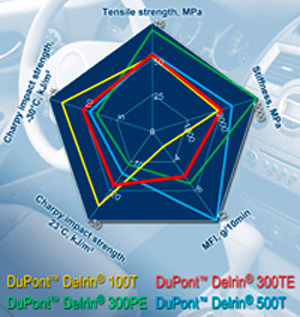Oct 20 2011
New low-emission DuPont Delrin 300TE acetal resin (POM) is the first impact-modified POM from DuPont Performance Polymers (DuPont) to meet the automotive industry's demanding requirements for the use of plastics in vehicle interiors. This extends the scope of application for Delrin acetal resins in vehicles to include plastic components in interiors, where high resistance to impact load is required.
"In the light of rising demand for quality among consumers, the automotive industry sets extremely low limits for the emission of volatile organic compounds (VOC)," said Hans-Hermann Kirner, material development manager for automotive interiors at DuPont. "Tests of samples of the new impact-modified Delrin 300TE, conducted by the renowned independent Fresenius Institute in Herten, Germany, revealed formaldehyde emissions of 1.0 mg/m² and lower. Such results are considerably below the limit of 2.0 mg/m² set by leading German OEMs and mean that the new material meets the world's most stringent requirements with regard to VOC emissions in this sector."
 New impact-modified and low-emission DuPont™ Delrin® 300TE extends the scope of application of POM. This ranges from extensive, visible parts to small, functional components such as levers and gears, and now also includes applications in automotive interiors, for instance in the seating area, where resistance to high impact loads is required.
New impact-modified and low-emission DuPont™ Delrin® 300TE extends the scope of application of POM. This ranges from extensive, visible parts to small, functional components such as levers and gears, and now also includes applications in automotive interiors, for instance in the seating area, where resistance to high impact loads is required.
With a melt flow index (MFI190/2,16) of 6 g/10min, Delrin 300TE bridges the gap between Delrin 100T (MFI = 2), which combines high viscosity with very high impact resistance, and the medium viscosity, stiffer Delrin 500T (MFI = 12).
Delrin 300TE is considerably more impact resistant than Delrin 300PE, a previously launched low-emission grade that also is suitable for use in automotive interiors. It achieves a notched impact strength at 23°C of 18 kJ/m² (Delrin 300PE: 11 kJ/m²). At -30°C, the notched impact strength of the new 300TE grade is still as high as 10 kJ/m² (300PE: 8 kJ/m²).
As with all members of the acetal resin family from DuPont, new Delrin 300TE also combines high strength, hardness and stiffness over a broad temperature range with high abrasion resistance and a low coefficient of friction, a high heat deflection temperature, good electrical and dielectric properties and high dimensional stability.
Kirner adds: "Thanks to its high-melt flow, thin-walled parts with long flow paths - for instance the struts used in headrests - are among the principal areas for developments in Delrin 300TE. In general all POM grades are suitable for use in low-noise and low-friction control and drive systems." Additional low-emission grades for delicate, small parts are in development.
DuPont offers more than 100 materials and product families for the global automotive industry. Through its global application development network, DuPont Automotive is committed to collaborating with customers throughout the value chain to develop new products, materials, components and systems that help reduce dependence on fossil fuels and protect people and the environment. For more information, visit automotive.dupont.com.
DuPont (NYSE: DD) has been bringing world-class science and engineering to the global marketplace in the form of innovative products, materials, and services since 1802. The company believes that by collaborating with customers, governments, NGOs, and thought leaders we can help find solutions to such global challenges as providing enough healthy food for people everywhere, decreasing dependence on fossil fuels, and protecting life and the environment.